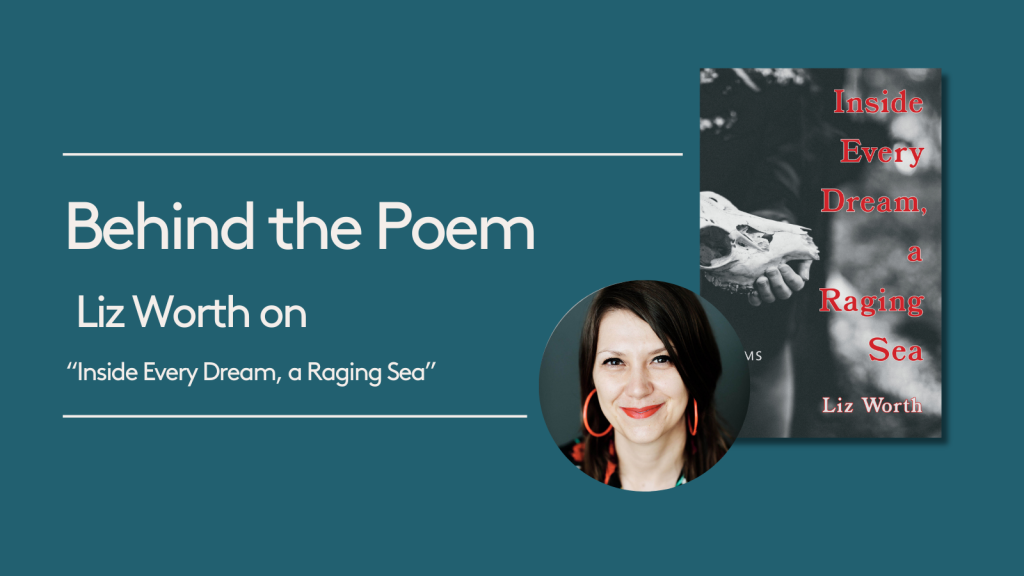Behind the Poem with Liz Worth

Today, we invite Liz Worth to the blog to share thoughts on a poem from her new collection, Inside Every Dream, a Raging Sea! Read on for insights into the initial inspirations behind the poem entitled It’s Not As Bad As It Looks! Off to Liz!
Many of the poems in this collection were written during the final years of my mother’s life as she struggled with dementia. While the collection is based on many themes, my relationship with my mother is a strong thread throughout.
We had a challenging, contradictory relationship. She could be stubborn and unforgiving, child-like and emotionally evasive. She could also be funny and warm and thoughtful.
I never knew which side I would get when we were in the same room. Sometimes I would experience all sides of her within an afternoon.
We unfortunately brought out the worst in each other many times. When I was a kid I didn’t understand this as much as I do now.
In spite of the friction between us we remained close by necessity. I was my mother’s only child and we were often alone together when I was growing up. My dad worked evenings and weekends at a security desk on rotating shifts, which meant he was usually gone when I was getting home from school.
My mother was an anxious person, bordering on paranoid. She would become mad at anything for any reason. Sometimes her anger came out of something imaginary, or out of a misinterpretation of a glance you weren’t aware of giving.
I didn’t recognize these traits for what they were when I was a kid. Sometimes when my mother’s fears came to pass she would become convinced she was psychic.
“It’s Not As Bad As It Looks” is an account of one such instance.
You say ‘psychic’ and I see a spectre / It crawls out of the back of your shirt, hovers / over the dining room table.
I had been riding my bike with my friends after school. One of the girls I was with was showing off, riding without holding the handlebars while drinking a can pop. We were all distracted by her. I was laughing hard: It was a funny moment, and an impressive one. I could only dream of being so daring.
I wasn’t watching where I was going and rode too close to the back end of a parked car. My shin and calf scraped along the bumper, coming away dirty and skinned. The car was fine. We all kept riding on, laughing even harder now.
It all happened in a matter of seconds. I thought nothing of it until I got home and noticed the blood running down my leg. My mom saw it before I had a chance to wash up in the bathroom.
When I got home my mother noticed right away: “What happened to your leg?”
When I told her she was livid. I can’t remember the reasons she gave. When we sat down for dinner, she kept talking about it: “I had a premonition about your leg, you know. I’m psychic, Liz. I am. Your friend’s an instigator. Your father’s going to be upset.”
The food on my plate is cold / leftover from yesterday / I mash it into the ceramic.
White cream squeezes through / fork prongs. There’s still blood on my leg.
The idea of my mother being psychic would permeate our relationship until I reached adulthood and moved out. It became a running accusation whenever my mother felt I was defying her.
Still, you press for omniscience, believing / there’s more to me, believing everything / a pretence.
“Every thought in your head belongs to me,” you say…
After my dad died in 2013, my mother was on her own for the first time in her life. My parents had married at 19 and my mother had never lived alone until she was widowed.
When she developed dementia in late 2017, her care and well-being fell to me. Her communication skills were greatly affected by her disease. She would get frustrated in conversation: “I can’t find my words,” she would say, balling her fists.
In movies you often see characters who are terminally ill having reflective moments with the cast. Relationships are repaired, grievances laid to rest.
But life isn’t like the movies. When someone has a disease that impairs their cognition, there isn’t always a way to make amends together.
A cut comes between us because you let it.
My mother’s dementia would lead her to say strange things. Sometimes her words were almost oracular. Other times they came through as lucid and brutally honest.
In some ways, it felt like a parallel to the strange, surreal conversations we would have when I was a kid and we were alone at home together.
When I wrote this poem I had been thinking about these moments with my mother.
If you can see so much why do you miss / the aversion of my eyes, the guilt in my speech?
I was also thinking about how difficult life sometimes felt when my father wasn’t around: He was always a calming voice of reason between my mother’s temper and my childish ways.
And how again, in later years, my mother and I were on our own, without him, overcoming an insurmountable situation that neither of us were prepared for.
Praying, I ask for something easier than this.

